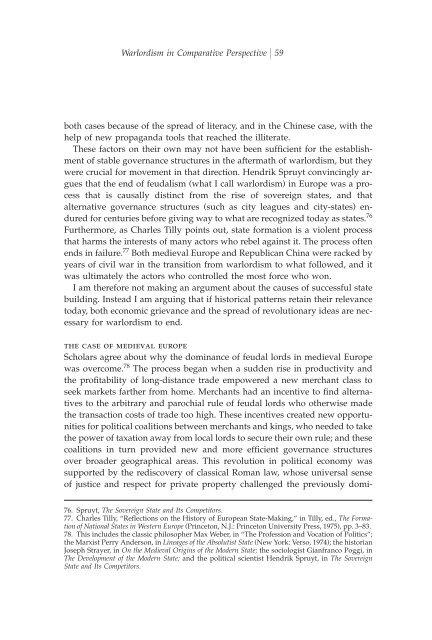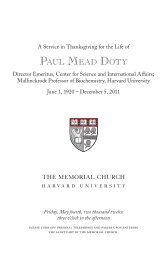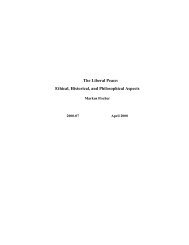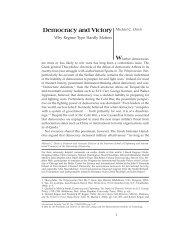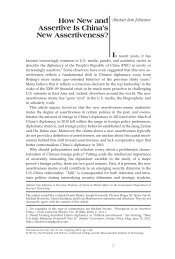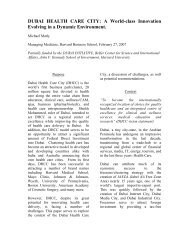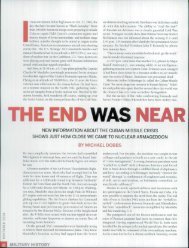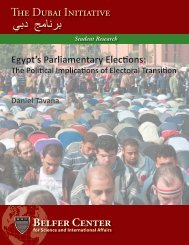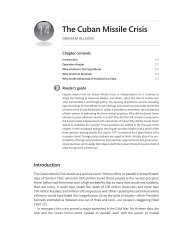Warlordism in Comparative Perspective - MIT Press Journals
Warlordism in Comparative Perspective - MIT Press Journals
Warlordism in Comparative Perspective - MIT Press Journals
Create successful ePaper yourself
Turn your PDF publications into a flip-book with our unique Google optimized e-Paper software.
<strong>Warlordism</strong> <strong>in</strong> <strong>Comparative</strong> <strong>Perspective</strong> 59<br />
both cases because of the spread of literacy, and <strong>in</strong> the Ch<strong>in</strong>ese case, with the<br />
help of new propaganda tools that reached the illiterate.<br />
These factors on their own may not have been sufªcient for the establishment<br />
of stable governance structures <strong>in</strong> the aftermath of warlordism, but they<br />
were crucial for movement <strong>in</strong> that direction. Hendrik Spruyt conv<strong>in</strong>c<strong>in</strong>gly argues<br />
that the end of feudalism (what I call warlordism) <strong>in</strong> Europe was a process<br />
that is causally dist<strong>in</strong>ct from the rise of sovereign states, and that<br />
alternative governance structures (such as city leagues and city-states) endured<br />
for centuries before giv<strong>in</strong>g way to what are recognized today as states. 76<br />
Furthermore, as Charles Tilly po<strong>in</strong>ts out, state formation is a violent process<br />
that harms the <strong>in</strong>terests of many actors who rebel aga<strong>in</strong>st it. The process often<br />
ends <strong>in</strong> failure. 77 Both medieval Europe and Republican Ch<strong>in</strong>a were racked by<br />
years of civil war <strong>in</strong> the transition from warlordism to what followed, and it<br />
was ultimately the actors who controlled the most force who won.<br />
I am therefore not mak<strong>in</strong>g an argument about the causes of successful state<br />
build<strong>in</strong>g. Instead I am argu<strong>in</strong>g that if historical patterns reta<strong>in</strong> their relevance<br />
today, both economic grievance and the spread of revolutionary ideas are necessary<br />
for warlordism to end.<br />
the case of medieval europe<br />
Scholars agree about why the dom<strong>in</strong>ance of feudal lords <strong>in</strong> medieval Europe<br />
was overcome. 78 The process began when a sudden rise <strong>in</strong> productivity and<br />
the proªtability of long-distance trade empowered a new merchant class to<br />
seek markets farther from home. Merchants had an <strong>in</strong>centive to ªnd alternatives<br />
to the arbitrary and parochial rule of feudal lords who otherwise made<br />
the transaction costs of trade too high. These <strong>in</strong>centives created new opportunities<br />
for political coalitions between merchants and k<strong>in</strong>gs, who needed to take<br />
the power of taxation away from local lords to secure their own rule; and these<br />
coalitions <strong>in</strong> turn provided new and more efªcient governance structures<br />
over broader geographical areas. This revolution <strong>in</strong> political economy was<br />
supported by the rediscovery of classical Roman law, whose universal sense<br />
of justice and respect for private property challenged the previously domi-<br />
76. Spruyt, The Sovereign State and Its Competitors.<br />
77. Charles Tilly, “Reºections on the History of European State-Mak<strong>in</strong>g,” <strong>in</strong> Tilly, ed., The Formation<br />
of National States <strong>in</strong> Western Europe (Pr<strong>in</strong>ceton, N.J.: Pr<strong>in</strong>ceton University <strong>Press</strong>, 1975), pp. 3–83.<br />
78. This <strong>in</strong>cludes the classic philosopher Max Weber, <strong>in</strong> “The Profession and Vocation of Politics”;<br />
the Marxist Perry Anderson, <strong>in</strong> L<strong>in</strong>eages of the Absolutist State (New York: Verso, 1974); the historian<br />
Joseph Strayer, <strong>in</strong> On the Medieval Orig<strong>in</strong>s of the Modern State; the sociologist Gianfranco Poggi, <strong>in</strong><br />
The Development of the Modern State; and the political scientist Hendrik Spruyt, <strong>in</strong> The Sovereign<br />
State and Its Competitors.


